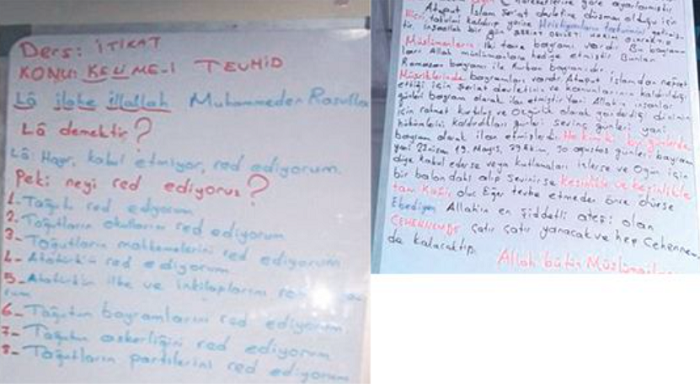By Abdullah Bozkurt
Cells linked to Turkish networks of al-Qaeda and Islamic State of Iraq and Levant (ISIL) have been mushrooming in İstanbul’s conservative Sultanbeyli district where the ruling Justice and Development Party (AKP) government, rooted in Islamist ideology, received the highest votes on April 16 referendum that gave Turkey’s already autocratic President Recep Tayyip Erdoğan imperial powers.

Police knew all the hotspots operated by Jihadist groups in the district, but has done nothing serious to crackdown on these networks that appear to have been enjoying the political cover provided for Islamist groups by the current AKP government. The only time we have seen an action against al-Qaeda and ISIL cells by the law enforcement agencies is around the time when Turkish government came under the pressure from the US-led coalition as well as grievances voiced by both Russia and China, two countries that send most Jihadists to Syria through Turkey.
Yet, what I call “revolving door policy’ by Erdoğan-led AKP government has always been in effect, letting Jihadists go free after a brief journey through the criminal justice system. There are dozens of cases to suggest that this has been a pattern all along. The last example came from Sultanbeyli district where many ISIL suspects were let go in the trial hearings despite serious
charges filed against them in the indictment.

The original indictment against 35 suspects (28 were in pre-trial detention at the time) revealed that ISIL has been running training and education centers in places very close to the police station in Sultanbeyli. The photos that were included as the evidence in the case file show small children as young as 4 holding toy AK-47 guns in military fatigues and taking roles in Jihadist plays.
The lecture notes found during the execution of search warrant showed the illegal education center brands those who celebrate Turkey’s national holidays as infidels, asked the followers to reject Turkish courts, and military service. In WhatsApp communications made by a suspect named Vatansever İşlek with other suspects, ISIL militants were calling for an armed Jihad, welcoming the killing of Turkish soldiers, and making plans for firearm

shooting training in a wooded area of İstanbul. Two education centers named ‘Sübyan” school and “Ribat Education Institution” as well as a makeshift mosque were identified as places where ISIL suspects meet for training and indoctrination. In police raids, 19 children were found attending the education centers run by the ISIL.
The indictment also uncovered how ISIL scouted for targets in both Ankara and Istanbul as part of what investigators believe is to identify possible attack sites. For example, a suspect named Selim Sümeli, already under police surveillance, made a trip to Ankara to visit Turkish Parliament for assess the site for possible assault. This information was also confirmed by the deputy Parliament Speaker Ahmet Aydın who responded to a Parliamentary question and said that the ISIL

The instructions were believed to be given by Metin Ç. (AKA Abu Darda al-Turki) and Mustafa G. (Abu Hamza) in Syria. When Sümeli was detained, his phone had cryptic messaging application Truecrypt. He also surveilled Zeynebiyye Mosque, affiliated with pro-Iranian Jafari group, in İstanbul’s Küçükçekmece district. Investigators believe Sümeli was looking for an operative to stage an attack and contacted other suspects İbrahim D., Şuayip A. & Abdulsamet Ç. for that purpose.
In the indictment, public prosecutor Mehmet Şenay Baygın asked aggravated life sentences for six

suspects (Selim Sümeli, Ali Karataş, Emin Güneş, Fatma Küçük, Orhan Küçük & Serdar Kerim) on charges of attempting to change the constitutional order of Turkey, and up to 15 year jail sentences for the rest on charges of belonging to an armed terror group.
In the first hearing of the case that was held on April 20, 2017 by İstanbul No.13 High Criminal Court, Sürmeli denied charges and claimed he flew to Ankara to visit an old friend, but was unable to meet him when the friend’s wife got sick. Instead, he dropped by another friend’s place in Demetevler District and hang out there for a while before returning to İstanbul on a flight. Another suspect Yunus Emre Doğan admitted that some of his family members joined the ISIL in 2014 but he is not a member of ISIL. The suspect Kurbani Karakış claimed he and his wife were being tried in the court of law because of how they look with beard and chador.
Orhan Küçük appears to be an interesting character in the case as a suspect who worked as an Imam in the illegally operated ISIL mosque. He denied charges of making a propaganda for ISIL, instead

Gönül Arbat, defendant in the case, said her husband joined the fight in Iraq two years ago without even letting her know about it, stressing that she was the victim of the ISIL. “I despise this organization because it torn my family apart, leaving me with two children alone”.
Fatma Küçük, the suspect who was accused of running Ribat Education Institution (Ribat Eğitim Kurumu in Turkish), says she is not even a high school graduate and has no qualification of directing such an education center. Küçük was detained just before the hearing took place although she was named as the suspect in the indictment. The İstanbul court formally arrested her after she gave her testimony electronically from Ankara.
However, in the first hearing of the case, the court decided to release 13 suspects. Veysi Salman, Vatansever İşlek, İrfan Er, Serhat Yaman, Sinan Altun, Ercan Tekin, Rukiye Karakış, Kurbani Karakış, Gönül Alpat, İdris Öztürk, Abdullah Basatuğrul, Turgay Buğda & Vural Nuhoğlu were all released pending trial. The usual pattern in such cases is that ISIL suspects were released in stages. Some gets released by the police before even prosecutor’s testimony while another group was let go by the prosecutor who does not even ask the court for an arraignment hearing. The third group are released by the investigating judge at the arraignment hearing. Most are released in trial hearings, starting with the first hearing into the case. In many cases, no suspect remains in pre-trial detention in the second and third trial hearings.
For example, on March 24, 2016, the same İstanbul court (No.3 High Criminal Court) ruled to release radical preacher Halis Bayancuk (aka Abu Hanzala who is known as senior al-Qaeda leader in Turkey) and all the remaining defendants who were in pre-trial detention in an ISIL case in which 97 suspects were being tried. In the same hearing, the court also released Asaad Khelifalkhadr (aka Ebu Suheyf), a Kuwaiti national listed as the number one suspect in the 315-page indictment as a trafficker of Jihadists. The court ignored the overwhelming evidence incriminating both Abu Hanzala and Ebu Suheyf, including wiretap records that detailed how the network picked up foreign Jihadists from an Istanbul airport and helped them travel to border provinces to cross into Syria.
In another example, ISIL’s Turkish cell led by Tatlıbal Group, which operates from Ankara’s old city of Ulus, around the Hacıbayram neighborhood, had also escaped the close scrutiny of the criminal justice system as well. The investigation, launched in 2014 resulted in an indictment on March 9, 2016, with the prosecutor filing charges against 17 who faced possible jail time ranging from seven-and-a-half to 15 years. However only 10 suspects were arrested, while four were released before the trial even started despite the fact that three remained at large. At the May 18, 2016 hearing, seven more were released. During the last hearing held on July 12, 2016, the remaining three suspects were also let go.
April 24, 2017
















